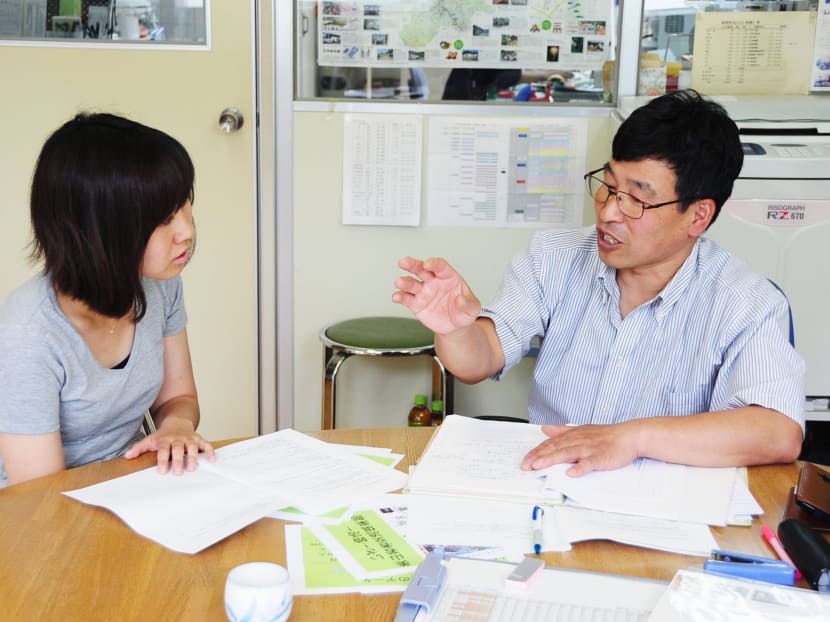Tempting Japan’s city folk to taste country life
KYOTO — As working-age Japanese leave the countryside for cities, local governments are trying to turn idle properties into homes for city dwellers seeking a quieter life in the countryside.

Ms Asuka Chiba (L), a member of the "relocation concierge" group that promotes relocation into Kyoto Prefecture, meets with Mr Kenji Kono, a regional promotion leader in Kyoto's Nantan city on June 20, 2017, in the city to discuss how to support urban dwellers seeking a quieter, rural lifestyle there. Source: Kyodo
KYOTO — As working-age Japanese leave the countryside for cities, local governments are trying to turn idle properties into homes for city dwellers seeking a quieter life in the countryside.
The Kyoto prefectural government has led the way in April last year to promote relocation into the prefecture’s designated rural areas. It gives out subsidies for remodelling vacant properties, apart from advising city dwellers moving into the area. It also helps incoming people with mapping out a moving plan, while it surveys available idle properties, and provides subsidies for renovating houses as well as for deploying farming advisers.
Mr Masaki Aota, a 39-year-old operator of a nature school in the city of Nantan, Kyoto Prefecture, is an example of a city dweller who wants to live in the countryside. “It took me two-and-a-half years to find an ideal home,” recalls Mr Aota. “I asked many people around if they knew of a house I could buy, but everybody said ‘No’.”
Having quit his job in the prefecture’s metropolis, Kyoto city, he began working in nature-rich Nantan in the spring of 2014. But he had a hard time finding a house where he could move with his family and install a wood stove.
Relocation from cities to the countryside has become a quiet but steady boom recently in Japan. A Tokyo-based non-profit organisation supporting country-life seekers, the Furusato Kaiki Shien Centre, said it received 26,426 inquiries last year, a nearly fourfold increase from five years earlier.
Mr Aota’s experience is not unusual, even though the government believes there is a sufficient number of properties to meet the demands.
According to the Ministry of Internal Affairs and Communications, there were about 8.2 million idle properties across the nation in 2013, accounting for 13.5 per cent of the total number of properties. The ratio is said to be still growing.
Behind the difficulty relocation seekers have in finding a property is a demand-supply gap in the housing market, said Ms Asuka Chiba, 32, a member of the “relocation concierge” group that promotes relocation into Kyoto Prefecture.
People who seek to move from cities to rural areas want to rent a property to begin with so they can get used to life in a new environment. But there tend to be few properties for rent as owners of idle properties worry about how their neighbours think of them if they rent out their properties to “outsiders”, she said. Other municipalities followed Kyoto’s example to help city dwellers feel at home in the rural areas.
Gifu Prefecture in central Japan has introduced a policy of providing up to ¥1 million (S$12,072) in aid for people moving into unused houses in its rural areas from other prefectures.
Wakayama Prefecture in western Japan also provides subsidies for renovating idle houses or removing unwanted furniture from such houses.
“In order to ready unused houses for rent, cooperation and trust-building are necessary between the municipal government and local residents,” said Mr Kenji Kono, 56, a leader of the regional promotion group in the Chii district of Nantan City.
“Houses may not be in use. But their owners may still have a family Buddhist altar there. There are various reasons owners cannot rent out their properties immediately,” he said. KYODO NEWS






